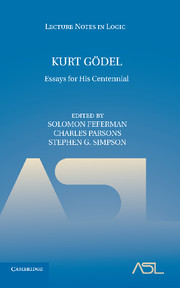Book contents
- Frontmatter
- Contents
- Introduction
- GENERAL
- PROOF THEORY
- SET THEORY
- PHILOSOPHY OF MATHEMATICS
- What did Gödel believe and when did he believe it?
- On Gödel's way in: The influence of Rudolf Carnap
- Gödel and Carnap
- On the philosophical development of Kurt Gödel
- Platonism and mathematical intuition in Kurt Gödel's thought
Platonism and mathematical intuition in Kurt Gödel's thought
Published online by Cambridge University Press: 04 August 2010
- Frontmatter
- Contents
- Introduction
- GENERAL
- PROOF THEORY
- SET THEORY
- PHILOSOPHY OF MATHEMATICS
- What did Gödel believe and when did he believe it?
- On Gödel's way in: The influence of Rudolf Carnap
- Gödel and Carnap
- On the philosophical development of Kurt Gödel
- Platonism and mathematical intuition in Kurt Gödel's thought
Summary
The best known and most widely discussed aspect of Kurt Gödel's philosophy of mathematics is undoubtedly his robust realism or platonism about mathematical objects and mathematical knowledge. This has scandalized many philosophers but probably has done so less in recent years than earlier. Bertrand Russell's report in his autobiography of one or more encounters with Gödel is well known:
Gödel turned out to be an unadulterated Platonist, and apparently believed that an eternal “not” was laid up in heaven, where virtuous logicians might hope to meet it hereafter.
On this Gödel commented:
Concerning my “unadulterated” Platonism, it is no more unadulterated than Russell's own in 1921 when in the Introduction to Mathematical Philosophy … he said, “Logic is concerned with the real world just as truly as zoology, though with its more abstract and general features.” At that time evidently Russell had met the “not” even in this world, but later on under the influence of Wittgenstein he chose to overlook it.
One of the tasks I shall undertake here is to say something about what Gödel's platonism is and why he held it.
A feature of Gödel's view is the manner in which he connects it with a strong conception of mathematical intuition, strong in the sense that it appears to be a basic epistemological factor in knowledge of highly abstract mathematics, in particular higher set theory. Other defenders of intuition in the foundations of mathematics, such as Brouwer and the traditional intuitionists, have a much more modest conception of what mathematical intuition will accomplish.
- Type
- Chapter
- Information
- Kurt GödelEssays for his Centennial, pp. 326 - 355Publisher: Cambridge University PressPrint publication year: 2010
- 1
- Cited by

